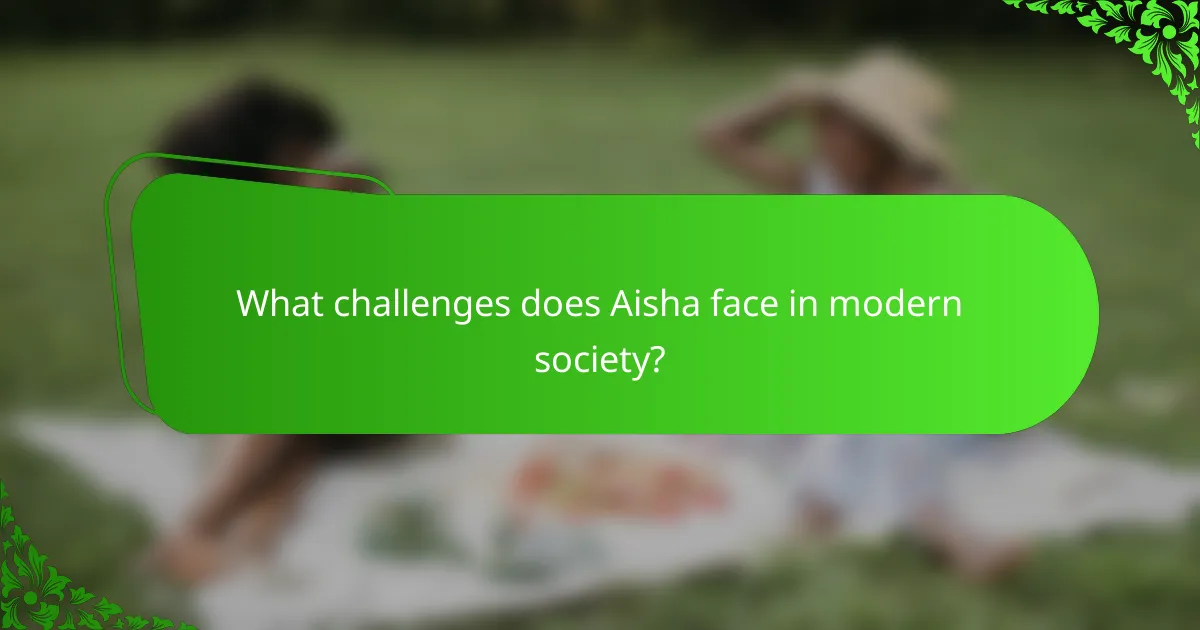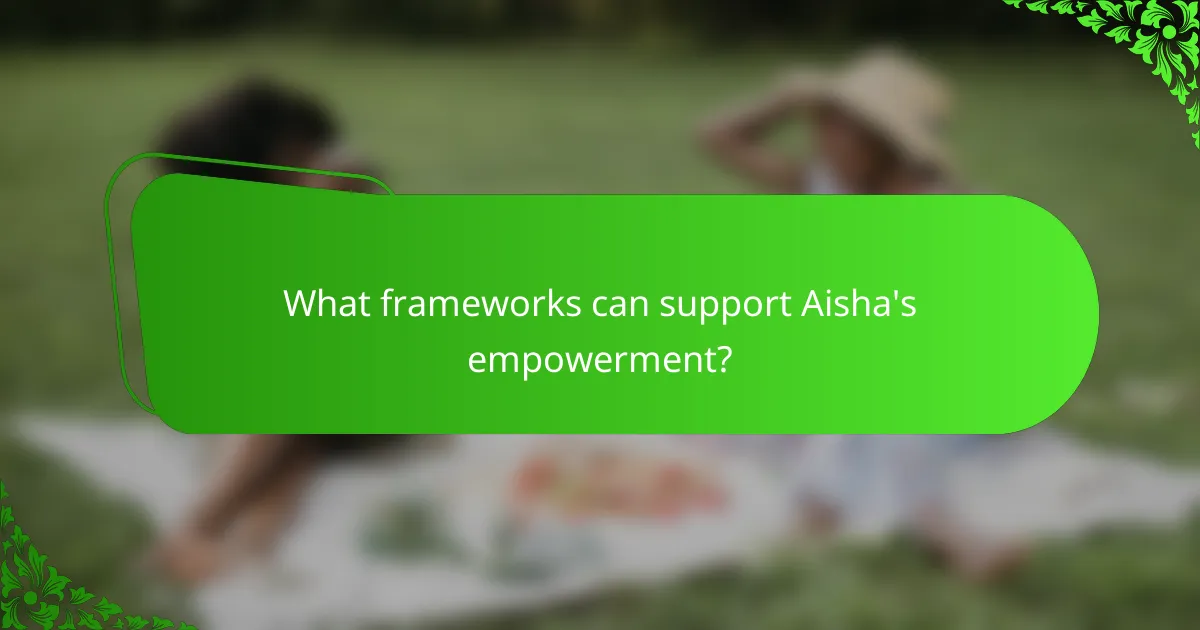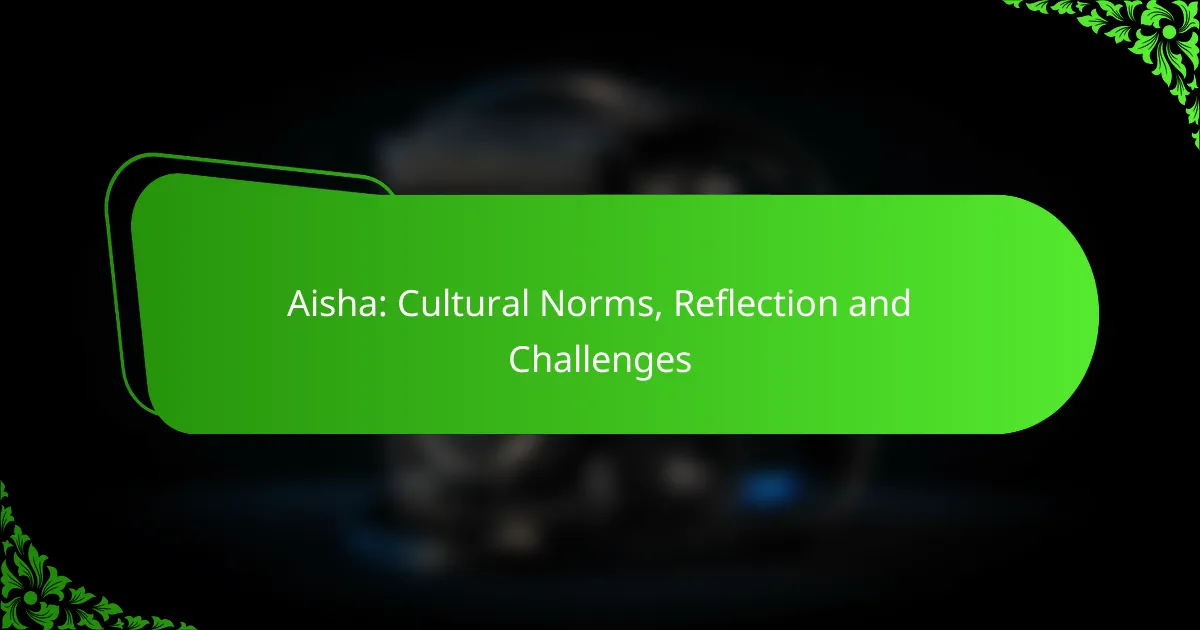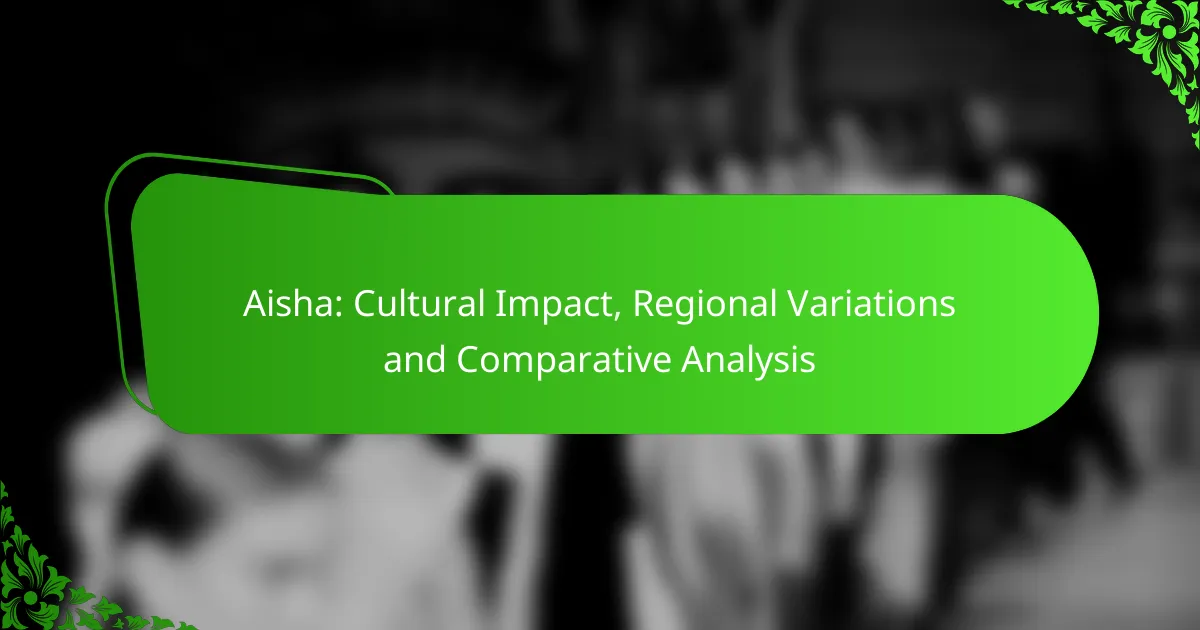The name Aisha carries profound significance in Middle Eastern societies, where cultural norms shaped by tradition, religion, and social structures play a pivotal role in defining women’s identities and experiences. As a symbol of cultural identity, Aisha reflects the values and struggles of her community, navigating the complexities of societal expectations. However, she also confronts significant challenges, including gender inequality and limited access to opportunities, which can impede her personal and professional development in an evolving world.

What are the cultural norms surrounding Aisha in Middle Eastern societies?
Cultural norms surrounding Aisha in Middle Eastern societies are deeply influenced by traditions, religion, and social structures. These norms dictate behaviors, roles, and expectations within families and communities, shaping the identity and experiences of women named Aisha.
Gender roles and expectations
In many Middle Eastern societies, traditional gender roles are prevalent, with distinct expectations for men and women. Women, including those named Aisha, often face societal pressure to fulfill roles as caregivers and homemakers, while men are typically seen as providers. This division can limit opportunities for women in education and employment.
However, there is a growing movement towards gender equality, with more women pursuing careers and higher education. This shift is challenging traditional norms, leading to a gradual redefinition of gender roles in various communities.
Family structure and values
Family is a central pillar in Middle Eastern cultures, often characterized by strong kinship ties and collective values. Families typically emphasize respect for elders and loyalty among members, which shapes the upbringing of individuals like Aisha. Extended families often live together or maintain close relationships, influencing daily life and decision-making.
In many cases, marriages are arranged, reflecting the importance of family approval and social standing. This practice can impact personal choices and the autonomy of women, including their freedom to choose partners.
Religious influences on behavior
Religion plays a significant role in shaping cultural norms in Middle Eastern societies, with Islam being the predominant faith. The teachings of Islam influence various aspects of life, including dress codes, social interactions, and family dynamics. For instance, women are often expected to dress modestly, which can affect how Aisha and others express their identity.
Religious observances, such as Ramadan, also dictate social behavior and community engagement, fostering a sense of belonging and shared values among individuals.
Social etiquette and traditions
Social etiquette in Middle Eastern cultures is guided by respect and hospitality. Greetings are often formal, with handshakes or kisses on the cheek being common among acquaintances. For Aisha, understanding these customs is crucial for navigating social interactions successfully.
Traditions such as family gatherings, festivals, and communal meals are integral to social life, reinforcing bonds within communities. Participation in these events is often expected, highlighting the importance of social cohesion and cultural heritage.

How does Aisha reflect cultural identity?
Aisha serves as a powerful symbol of cultural identity, embodying the values, traditions, and struggles of her community. Through her experiences and representation, she illustrates the complexities of cultural norms and the challenges faced by individuals within those frameworks.
Representation in literature and art
Aisha’s character is often depicted in various forms of literature and art, showcasing her as a representation of resilience and cultural heritage. Artists and writers draw upon her story to explore themes of identity, belonging, and the intersection of tradition and modernity. This representation not only highlights her significance but also encourages dialogue about cultural narratives.
For instance, contemporary novels may portray Aisha navigating the expectations of her community while seeking personal freedom, reflecting the ongoing tension between individual desires and collective norms. Such portrayals resonate with audiences, fostering a deeper understanding of cultural identity.
Impact on social movements
Aisha has become a figurehead in various social movements, symbolizing the fight for women’s rights and cultural preservation. Her story inspires activism, encouraging individuals to challenge oppressive norms and advocate for equality. Movements that focus on gender equity often cite her as a motivational figure, illustrating the need for change within cultural contexts.
Moreover, Aisha’s influence can be seen in campaigns that promote education and empowerment, emphasizing the importance of giving voice to marginalized communities. By rallying around her narrative, activists can effectively mobilize support and raise awareness about critical social issues.
Role in community cohesion
Aisha plays a vital role in fostering community cohesion by embodying shared values and traditions. Her story resonates with many, serving as a unifying force that brings individuals together around common cultural experiences. This sense of belonging is crucial for maintaining cultural identity in diverse societies.
Community events, such as festivals or storytelling gatherings, often feature Aisha’s narrative, reinforcing cultural ties and encouraging intergenerational dialogue. By celebrating her legacy, communities can strengthen their bonds and promote a collective identity that honors their heritage while adapting to contemporary challenges.

What challenges does Aisha face in modern society?
Aisha faces numerous challenges in modern society, including gender inequality, cultural pressures, and limited access to education and employment opportunities. These factors can significantly impact her personal and professional growth, often hindering her ability to thrive in a rapidly changing world.
Gender inequality issues
Gender inequality remains a significant challenge for Aisha, manifesting in various forms such as wage gaps, limited career advancement, and societal expectations. In many cultures, women are often expected to prioritize family responsibilities over professional aspirations, which can restrict their opportunities.
For instance, Aisha may encounter discrimination in the workplace, where men are favored for promotions or leadership roles. Addressing these inequalities requires systemic changes, including policies that promote equal pay and representation in decision-making positions.
Pressure from cultural expectations
Cultural expectations can impose strict roles on Aisha, dictating how she should behave, dress, and interact with others. These norms can create internal conflict, as she may feel torn between her personal desires and societal demands.
For example, Aisha might face pressure to marry early or conform to traditional gender roles, which can limit her independence. Navigating these expectations often requires a delicate balance between honoring her cultural heritage and asserting her individuality.
Access to education and employment
Access to education and employment is crucial for Aisha’s empowerment, yet many barriers persist. In some regions, educational opportunities for girls are limited, leading to lower literacy rates and fewer job prospects.
Aisha may also face challenges in securing employment due to biases in hiring practices or a lack of support for women in the workforce. To overcome these obstacles, advocacy for educational initiatives and job training programs is essential, helping to create a more equitable environment for women seeking to advance their careers.

What frameworks can support Aisha’s empowerment?
Frameworks that support Aisha’s empowerment include community programs and policy changes that promote gender equality and social inclusion. These frameworks aim to create an environment where Aisha can thrive personally and professionally, addressing cultural norms and systemic challenges.
Community programs and initiatives
Community programs play a crucial role in empowering individuals like Aisha by providing resources, support networks, and educational opportunities. Initiatives such as mentorship programs, skill development workshops, and local support groups can help build confidence and foster a sense of belonging.
For example, programs that focus on vocational training can equip Aisha with practical skills, enhancing her employability. Additionally, community events that celebrate cultural diversity can promote understanding and acceptance, breaking down barriers that hinder empowerment.
Policy changes and advocacy
Policy changes and advocacy efforts are essential for creating a supportive legal and social framework for Aisha’s empowerment. This includes advocating for laws that protect women’s rights, promote equal pay, and ensure access to education and healthcare.
Engaging with local governments and organizations to push for policy reforms can lead to significant improvements in Aisha’s community. For instance, initiatives that promote gender quotas in leadership positions can help increase representation and influence decision-making processes that affect women’s lives.

How can cultural norms evolve to support Aisha?
Cultural norms can evolve to support Aisha by fostering an environment that encourages open dialogue and integrates modern values with traditional practices. This evolution requires community engagement and a willingness to adapt while respecting cultural heritage.
Encouraging dialogue and awareness
Promoting dialogue within communities is essential for evolving cultural norms. This can be achieved through workshops, community meetings, and social media campaigns that raise awareness about Aisha’s challenges and aspirations.
Creating safe spaces for discussion allows individuals to express their views and share experiences. Engaging local leaders and influencers can amplify these conversations, fostering a collective understanding and support for Aisha’s needs.
Integrating modern values with tradition
Integrating modern values with tradition involves finding a balance that respects cultural heritage while embracing progressive ideas. This can include adapting traditional practices to be more inclusive and supportive of Aisha’s rights and opportunities.
For example, educational programs can incorporate contemporary gender equality principles while honoring cultural customs. Communities might also consider revising outdated practices that hinder Aisha’s development, ensuring that traditions evolve to reflect current societal values.

What are the future trends for Aisha in cultural contexts?
Future trends for Aisha in cultural contexts will likely focus on increased representation and evolving roles within various communities. As societal norms shift, Aisha’s influence in leadership and cultural narratives is expected to grow, reflecting broader changes in gender equity and social dynamics.
Emerging roles in leadership
Aisha is increasingly stepping into leadership roles across various sectors, including business, politics, and community organizations. This shift is driven by a growing recognition of the importance of diverse perspectives in decision-making processes.
Organizations are beginning to implement policies that promote female leadership, such as mentorship programs and flexible work arrangements. For example, companies in the EU are adopting quotas to ensure women hold a certain percentage of leadership positions, fostering an environment where Aisha can thrive.
To support Aisha’s emergence in leadership, communities can encourage networking opportunities and provide resources for skill development. Avoiding common pitfalls, such as tokenism or superficial support, is crucial for creating genuine pathways to leadership for Aisha.










